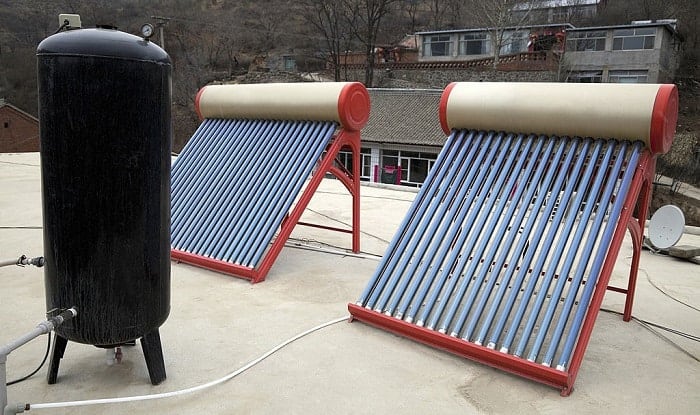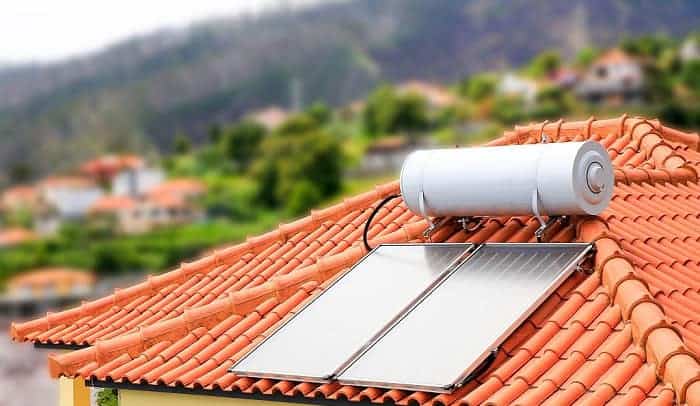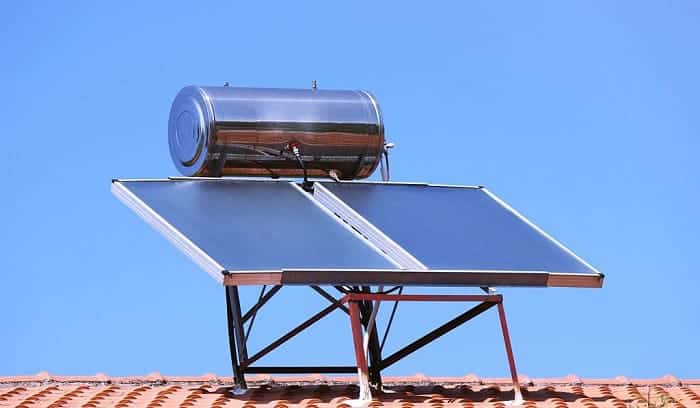Table of Contents
- Active & Passive Solar Hot Water System
- What are Solar-Powered Water Storage Tanks
- How Do You Install and Maintain a Solar Water Heater System
- Can the Solar Water Heater System Be Set Up Somewhere Other Than My Roof
- How Does a Solar Hot Water Heater Work
- Do Solar-Powered Water Heaters Work at Night
- What are The Perks You Can Enjoy If You Install a Solar Water Heater System at Home
- What are the Factors to Consider When Choosing the Right Solar-Powered Water Heating System
- Hiring a Solar Contractor
- Conclusion
If you’d like to save money and electricity, going solar is undoubtedly an intelligent choice. Investing in a solar powered water heater is worth considering, especially if you can’t live without hot water.
But, how do solar water heaters work?
First, the tank’s cold water goes to the solar collector that’s installed on the roof. This collector absorbs the sun’s heat and heats up the water. Then, the hot water flows back to the top of the tank, where it is delivered to you. Meanwhile, the cold water in the tank’s bottom is sent to the solar collector.
Let’s learn more about solar water heaters in the rest of this post!
Active & Passive Solar Hot Water System
It’s essential to understand that all solar-powered water heaters come in two forms: active and passive. Active solar water heaters use circulating pumps; on the other hand, passive solar water heaters move water through the water’s tendency to rise when it’s warmed.
1. Active Solar-Powered Water Heater
This system may comprise either indirect or direct circulation.An indirect system circulates a heat-transfer fluid through the collector to prevent freezing.
The anti-freeze liquid traverses via the heat exchanger within a storage tank. From there, it transmits its heat to your water. Fundamentally, it’s more complicated; nevertheless, it is ideal in climates where freezing temperatures ice up a direct system.
2. Passive Solar-Powered Water Heater
This system is generally cheaper than an active solar-powered water heater system. Nonetheless, it isn’t as efficient when transmitting heat since these units do not circulate the heater water quickly. Passive solar-powered water heater systems are also known for being durable and reliable.
What are Solar-Powered Water Storage Tanks
Solar water heater storage tanks are engineered with outlets and inlets connected from and to the solar collector. They also feature a well-insulated design.
A one-tank type of system makes use of a combination of a solar storage & backup heater in 1 tank. On the other hand, a two-tank system contains a solar-powered water heater that preheats the water before it traverses to a traditional water heater.
How Do You Install and Maintain a Solar Water Heater System
The correct installation of solar-powered water heaters primarily depends on several factors. You need to consider the climate in your region, your solar resource, safety issues, and the building code requirements in your location. Hence, we strongly suggest hiring a licensed solar contractor to work on the project.
After the setup process, appropriately maintaining your solar water heater system will significantly help it run sleekly and continuously. If you choose passive systems, you won’t have to deal with much maintenance.
On the other hand, for active systems, consider discussing the maintenance requirements with your system provider. It is also vital to refer to the manual of the system. The standard water heating components and plumbing call for the same maintenance as traditional systems.
Please note that glazing might require cleaning in dry climates where rainwater does not support a natural rinse.
A simple system’s periodic maintenance can be as infrequent as every three to five years. It is best to let your solar contractor handle the job.
Meanwhile, systems that come with electrical components typically call for a replacement after ten years.
Can the Solar Water Heater System Be Set Up Somewhere Other Than My Roof
Yes. You can assemble the system on a bracket on a south-facing wall, near your bathroom. But, remember the setup process can be a bit complex and may cost more.
You need to ensure that the fixing of your solar water heater system to the bracket is done correctly. You will also need to inspect if there’s available access to the system if repairs are necessary.
Finally, you can minimize the expense of hot water distribution piping because the system will be close to the use point in this type of setup process.
How Does a Solar Hot Water Heater Work
The solar water heater working principle is pretty straightforward and often seen as a basic system. The most crucial component of a solar-powered water heater is the solar collector, typically a solar panel situated on the roof. The solar collector works to captivate an ample amount of the sun’s energy and convert it into usable energy.
You use this energy to heat your water at home. The system also contains a well-insulated storage tank to store your heated water. Holding tanks are pretty large and can commonly hold around 80 gallons.
Moreover, the storage tank often comes with a specialized pump that aids in dispersing your water. The water is then transferred from the bottom section of the tank via the solar collector to re-heat and return to the tank to make usable hot water.
Finally, solar-powered water heaters call for a solar controller. This tool helps control the temperature inside the tank. It also prompts the pump to switch on when hot water is required.
To dig into how solar water heaters work, you might find this video worth watching:
Do Solar-Powered Water Heaters Work at Night
Luckily, the majority of solar-operated water heaters are equipped with an additional backup unit. Typically, this is a gas-powered or electric-operated conventional water heater. The main objective of the backup unit is not to produce hot water but to beef up the amount of hot water.
At dusk, the backup hot water tank will switch on temporarily to supply hot water.
Keep in mind that the backup unit is purposely for reinforcing the heat so that the energy costs from the backup unit are lesser.
What are The Perks You Can Enjoy If You Install a Solar Water Heater System at Home
Solar water heating units can offer you the following benefits:
- They are safer options compared to electric geysers because they are placed on the roof of your house.
- Solar water heater systems are eco-friendly, so you can have peace of mind that they are non-polluting.
- Best of all, they are ideal alternatives as they remarkably help save energy and money. As you might already know, electricity is becoming more and more costly. Further, its availability is becoming undependable.
What are the Factors to Consider When Choosing the Right Solar-Powered Water Heating System
Before making the final purchasing decision and assembling your solar water heating system, make sure that you consider the following:
- Evaluate the energy and cost efficiency of the solar water heater
- Assess the solar resource in your area
- Figure out the suitable size of the solar water heating system
- Inspect the local regulations, covenants, and codes
It is also critical to have an in-depth knowledge of the diverse components required for the system, such as:
- Heat-transfer liquids for solar-powered heaters
- Heat exchangers for solar-powered heating systems
Hiring a Solar Contractor
When hiring a contractor for the installation and maintenance of your solar-powered water heating system, it is best if you ask the following queries:
1. Does your firm have vast experience in setting up and maintaining solar-powered water heating systems?
Bear in mind that it is necessary to select a firm with extensive experience setting up the kind of solar heating unit you prefer and carrying out the operations you expect.
2. Is your firm certified or licensed?
Having a solar contractor’s or plumber’s valid license is a must in some regions. To be sure, you might want to consider referring to your county or city for more details. You can validate the licensing with your state’s contractor licensing board.
Apart from this, the licensing board could share other related info, such as any issues or objections against state-licensed contractors.
3. How many years of experience does your firm have with solar heating setup and maintenance?
When it comes to the company’s experience, the more experiences the firm has, the better. You may consider requesting a record of their previous clients who could provide you with references.
Conclusion
Unquestionably, the availability of hot water can become a significant problem, specifically at night, during gloomy or cold days. Solar water heating systems are undoubtedly simple units; yet, they are worthwhile investments. Installing one can automatically help minimize your electric bills.
Hopefully, we’re able to answer your question about “how do solar water heaters work?” Again, before we end this post, we’d like to remind you that before buying or installing your solar water heater, you must:
- Determine the solar resource in your location, and the correct size for the unit
- Research about the local regulations, covenants, and codes
- Have knowledge about the various components required for the system

I am Kathleen Miller, staff writer and reviewer of the Avasolar team. Working with the team has been a pleasure for me so far, I hope to bring readers useful information by creating detailed and easy-to-follow contents.



